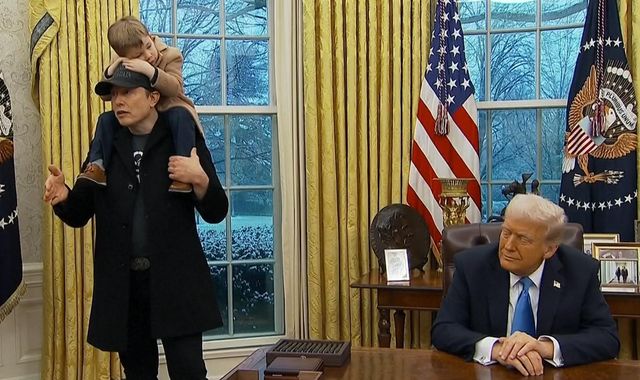Israel's Security Concerns Amidst Renewed Iran Nuclear Talks

Table of Contents
Iran's Nuclear Ambitions and Regional Hegemony
Israel's security concerns regarding Iran are deeply rooted in the country's stated nuclear ambitions and its expanding regional influence. These two factors create a complex and dangerous threat landscape for the Israeli state.
The Threat of a Nuclear-Armed Iran
Iran's pursuit of a nuclear weapons capability poses an existential threat to Israel. While Iran officially denies seeking nuclear weapons, its past actions and continued advancements in its nuclear program fuel deep skepticism. This includes enriching uranium to levels far beyond those needed for peaceful purposes. The potential for regional instability and military escalation resulting from a nuclear-armed Iran is immense. Israel has consistently maintained a policy of preventing Iran from acquiring nuclear weapons, viewing it as a red line.
- Increased ballistic missile capabilities: Iran's growing arsenal of ballistic missiles, capable of reaching Israel, significantly increases the threat posed by a nuclear-armed Iran.
- Potential for nuclear proliferation to regional proxies: A nuclear-armed Iran could potentially transfer nuclear technology or materials to its proxies, such as Hezbollah and Hamas, further destabilizing the region and posing an even greater threat to Israel.
- Destabilization of the Middle East: The acquisition of nuclear weapons by Iran would likely trigger a regional arms race and significantly increase the risk of wider conflicts.
Iran's Expanding Regional Influence
Beyond the nuclear threat, Iran's growing regional influence is a major source of Israel's security concerns. Iran actively supports numerous proxy groups throughout the Middle East, including Hezbollah in Lebanon, Hamas in Gaza, and the Houthis in Yemen. These groups regularly engage in activities that directly threaten Israel's security.
- Increased military presence in Syria and Lebanon: Iran's growing military presence in Syria and Lebanon, in close proximity to Israel's borders, allows for increased potential for attacks and further destabilizes the region.
- Funding and training of militant groups: Iran provides significant financial and military support to these proxy groups, enabling them to carry out attacks against Israel and its interests.
- Threat of regional proxy wars: Iran's support for these groups fuels regional tensions and increases the likelihood of proxy wars, potentially drawing Israel into wider conflicts.
Weaknesses in a Potential Nuclear Deal & Israel's Concerns
Even a seemingly successful nuclear deal with Iran raises substantial concerns for Israel due to potential loopholes and weaknesses in its implementation and enforcement.
Sunset Clauses and Verification Mechanisms
Many past nuclear agreements have included "sunset clauses," limiting the duration of restrictions on Iran's nuclear program. Israel is deeply concerned about the possibility of Iran rapidly resuming its nuclear weapons program once these restrictions expire. Furthermore, the effectiveness of verification mechanisms is crucial. Weakened inspections would severely hamper Israel's ability to monitor Iran's nuclear activities.
- Concerns over insufficient transparency and accountability: A lack of transparency and robust accountability mechanisms in a deal would allow Iran to conceal its nuclear activities, eroding Israel's confidence in the agreement's effectiveness.
- Lack of robust verification mechanisms: Insufficient or poorly implemented verification mechanisms would severely limit the ability to detect and deter Iranian cheating.
- Potential for Iran to quickly rebuild its nuclear program after the deal expires: The possibility of Iran rapidly restarting its weapons program after the deal expires poses a significant threat to Israel's security.
Lack of Address to Iran's Ballistic Missile Program
A significant concern for Israel is the potential absence of restrictions on Iran's ballistic missile program in any nuclear deal. Iran's missile capabilities pose a direct threat to Israel's civilian population and military infrastructure.
- Increased threat of attacks on Israeli cities: Iran's ballistic missiles are capable of reaching major Israeli cities, posing a significant threat to civilian populations.
- Limited defenses against advanced ballistic missiles: Israel's defense systems may not be fully effective against advanced Iranian missiles.
- Potential for escalation of conflict: The use of ballistic missiles could escalate any conflict between Iran and Israel dramatically.
Israel's Response and Security Measures
Faced with these significant threats, Israel employs a multi-pronged approach to ensure its security.
Military Preparedness and Deterrence
Israel maintains a strong military and robust intelligence network to deter Iranian aggression and respond to threats effectively. This includes advanced air defense systems, cyber warfare capabilities, and extensive intelligence gathering.
- Advanced air defense systems: Israel possesses sophisticated air defense systems designed to intercept ballistic missiles and other threats.
- Cyber warfare capabilities: Israel's cyber capabilities play a significant role in monitoring and disrupting Iranian activities.
- Intelligence gathering and covert operations: Israel utilizes its intelligence services to gather information about Iran's nuclear program and other threats.
Diplomacy and International Alliances
Israel actively engages in diplomacy to build international support against Iran's nuclear program and its regional destabilizing activities.
- Strengthening alliances with the US and other countries: Israel works to maintain strong alliances to counter Iranian influence.
- Public diplomacy campaign to highlight concerns: Israel engages in public diplomacy to raise awareness of the threats posed by Iran.
- Coalition-building with regional partners: Israel seeks to build coalitions with regional partners who share concerns about Iran's actions.
Conclusion
Israel's security concerns regarding a potential renewed Iran nuclear deal are multifaceted and deeply rooted in Iran's nuclear ambitions, regional influence, and the potential weaknesses of any agreement. These anxieties extend beyond the immediate nuclear threat to include concerns about ballistic missiles, proxy conflicts, and regional instability. Understanding Israel's security concerns amidst renewed Iran nuclear talks is crucial for comprehending the volatile geopolitical landscape of the Middle East. Continued vigilance and a thorough assessment of any potential agreement are paramount to ensuring regional stability and mitigating the potential risks to Israel's security. Stay informed about the developments surrounding Israel's security concerns and the Iran nuclear deal for a comprehensive understanding of this critical issue.

Featured Posts
-
 Donderdagnacht Miley Cyrus Nieuwe Muziek
May 31, 2025
Donderdagnacht Miley Cyrus Nieuwe Muziek
May 31, 2025 -
 Recetas De Crepes Salados 8 Ideas Para Tu Merienda O Cena
May 31, 2025
Recetas De Crepes Salados 8 Ideas Para Tu Merienda O Cena
May 31, 2025 -
 Sanofi Quel Potentiel Boursier Reste T Il L Avis De Loeil Du Loup De Zurich
May 31, 2025
Sanofi Quel Potentiel Boursier Reste T Il L Avis De Loeil Du Loup De Zurich
May 31, 2025 -
 Receta Facil De Empanadas De Jamon Y Queso Sin Horno
May 31, 2025
Receta Facil De Empanadas De Jamon Y Queso Sin Horno
May 31, 2025 -
 Trump And Musk Oval Office Press Conference Scheduled For Friday
May 31, 2025
Trump And Musk Oval Office Press Conference Scheduled For Friday
May 31, 2025
